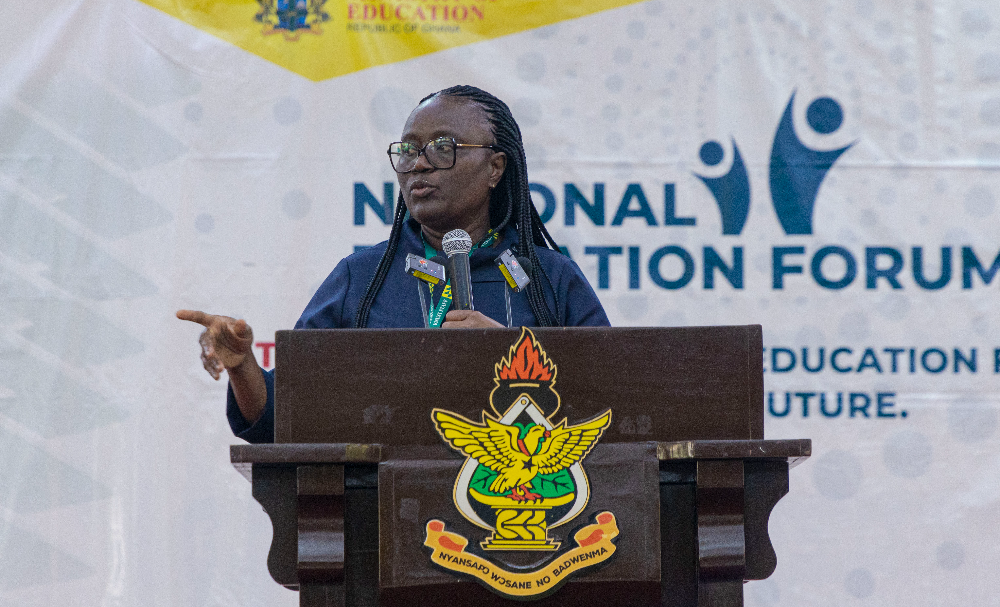The Kwame Nkrumah University of Science and Technology (KNUST), Kumasi has hosted the National Education Forum Zonal Stakeholder Engagement Series.
The forum which is under the theme "Transforming Education for a Sustainable Future," aimed to prepare Ghana's youth for further education, the workforce, and lifelong learning as responsible adults.
The forum is focused on addressing five key transformational pillars essential for national development including Infrastructure (Physical and EdTech), Education Quality Provisions, Education Financing, Regulatory and Accountability Systems, and Evidence for Decision Making.

Professor (Mrs.) Rita Akosua Dickson, Vice-Chancellor of KNUST and Chair of the Forum, emphasized the crucial role of education across all sectors of the economy.
“All sectors in this country depend on education,” she said. “I challenge you to name one sector that could function properly without education. We are all here today because education has played a key role in our lives.”
She reflected on the various reforms the nation has experienced, noting that the educational forum, initiated by the president, provides a unique opportunity for all stakeholders to contribute their ideas.
“It’s a huge responsibility, but also a privilege,” she continued. “At KNUST, our mission is to train international professionals who can excel anywhere in the world and compete favourably in the global job market. The responsibility placed on us is immense, but I have no doubt that with the participation of all stakeholders and organizations here today, we will rise to the occasion.”
The Ashanti Regional Minister, Dr. Frank Amoakohene, reaffirmed the government’s commitment to leaving no child behind and implementing long-lasting reforms to transform the educational sector.
"As we engage in this education forum, we expect that the contributions we make will help take children off the streets and ensure that every parent sends their child to school. Meanwhile, the government will ensure that an environment is provided where children can access education, no matter their background," he emphasized.
Dr. Amoakohene also stressed the importance of securing a costed national policy.
“We can come together and discuss ideas, but without funding, these changes cannot happen. It’s important to consider how we will finance these reforms, alongside developing recommendations," he said.
Reflecting on past successes, he pointed out that similar dialogues led to the establishment of the GET-Fund. He expressed hope that the forum would lead to the development of a framework for alternative funding options, particularly for higher education in Ghana.
“We believe that a person can be trained in Ghana and be just as qualified as any professional anywhere in the world,” he added.
Dr. Amoakohene further emphasized the government’s interest in regulatory and accountability systems, urging the need to streamline regulatory institutions to ensure they complement each other, rather than compete.
He believes this approach will help institutions comply with legal frameworks and ensure the effective functioning of the educational sector.
Dr. Amoakohene concluded by encouraging participants to be bold, sincere, and proactive in contributing to the improvement of the country’s education system, ensuring it serves the purpose for which it was established.
Mr. Kofi Asare, a Committee Member of the National Education Forum, highlighted the role of research in informing government policy.
"As part of the review process, extensive research has been conducted to guide the government on policy options, enabling us to learn and improve," he said.
He further emphasized that the National Education Forum is directly feeding into the review process, ensuring that the discussions are aligned with both the education sector’s medium-term development plan and the broader education strategic plan. "This explains how importance of the discussions we are having today," he added.
The forum featured a breakout session where key areas of interest within the five transformational pillars were discussed. During this session, critical issues were addressed, and specific recommendations were outlined.

















